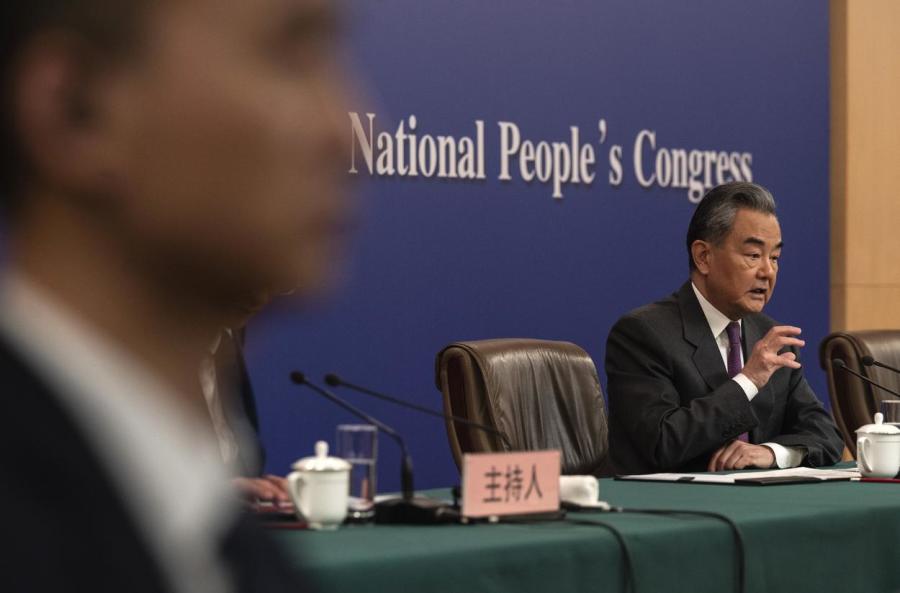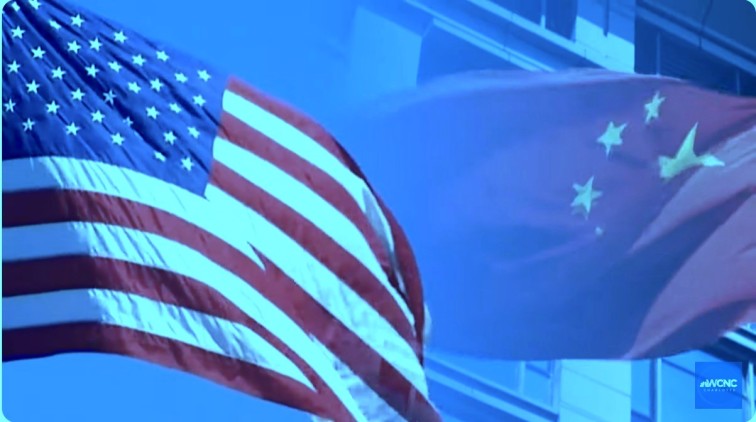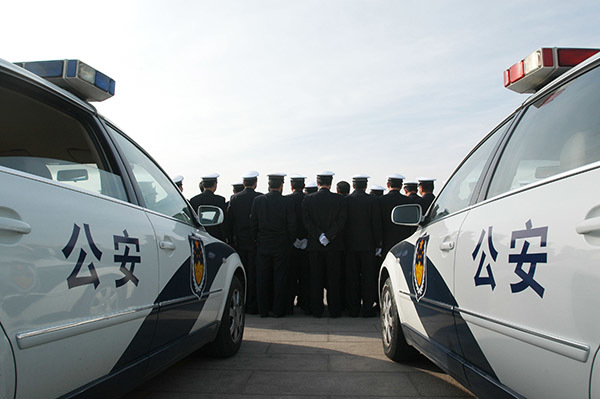File Photo: Chinese Foreign Minister Wang Yi speaks at a press conference for domestic and foreign journalists during the National People's Congress and Two Sessions held in Beijing, China, on March 7, 2024. (Photo by Kevin Frayer/Getty Images)
[People News] On July 14, the Chinese Communist Party's official media outlet, People's Daily, reported that Foreign Minister Wang Yi met with Russian Foreign Minister Sergey Lavrov in Beijing. The brief nature of the news evokes the CCP's characteristic approach: fewer words often indicate more significant matters. A review of Russian news reveals a markedly different account, suggesting that Wang Yi's recent comments regarding Europe are still generating discussion.
1. Wang Yi's Shifting Meeting Locations
According to a report from Russia's Public Television titled 'Lavrov and Wang Yi Discuss China-U.S. Relations and Solutions to the Ukraine Issue,' Wang Yi initially met Lavrov at the Great Hall of the People, took photographs, and then transitioned to an outdoor pavilion for tea and conversation.
The change from an indoor meeting to a casual tea gathering in a pavilion inevitably recalls Xi Jinping's meeting with Belarusian President Alexander Lukashenko at Zhongnanhai's Chunyi Hall, which was styled as a family banquet.
2. Discrepancies in Reporting from Russia and China Indicate Potential Strains in Bilateral Relations
The Chinese report stated:
People's Daily noted that Lavrov was attending the Shanghai Cooperation Organization (SCO) meeting and also referenced the September 3 military parade. The original text reads:
'This year marks the 80th anniversary of the victory of the Chinese people in the War of Resistance Against Japan, and both sides will also organize a series of commemorative activities for the 80th anniversary of the victory in World War II, aiming to uphold the correct historical narrative of World War II.'
Why is China collaborating with Russia for a military parade? What is the necessity of maintaining the historical narrative of World War II? Are there perhaps differing interpretations of history?
The Chinese Communist Party (CCP) has historically promoted the narrative of 'resisting Japan and expelling Chiang'. However, prominent historian Xin Haonian has challenged this view, asserting that the primary force in the War of Resistance against Japan was the Kuomintang (KMT). Publicly available data indicates that during this period, the CCP's forces killed 851 Japanese soldiers, while the KMT accounted for 318,883 deaths. It is clear who was genuinely resisting Japan. The civil war was heavily reliant on support from the Soviet Union, debunking the myth of 'millet and rifles'. The Soviet Union provided the CCP with $3.3 billion worth of supplies and weapons, and mobilized troops from Mongolia, Korea, and the Soviet Union to assist the CCP in initiating the civil war. Meanwhile, the United States remained passive, resulting in Chiang Kai-shek's (Jiang Jieshi) Kuomintang government ultimately retreating to Taiwan.
At this juncture, the CCP's emphasis on maintaining a false historical narrative raises the question: Is a larger crisis looming?
Reports from Russia:
On July 14, Russian 'Public Television' reported that the foreign ministers of Russia and China met to discuss relations with the United States, the situation on the Korean Peninsula, the Ukraine crisis, and issues concerning Iran, culminating in the signing of a joint statement. Wang Yi concluded by stating that the China-Russia relationship is 'the most stable, mature, and strategically valuable' among major countries in the contemporary world.
This information has not been reported by the CCP.
What brought Lavrov to Beijing?
On July 13, 'CIS Media' published an article suggesting that Beijing's statements are bold and contain deeper implications. The CCP claims neutrality in the Russia-Ukraine conflict while asserting the importance of upholding Ukraine's territorial integrity, yet it also emphasizes the need to consider Russia's concerns regarding the security risks associated with NATO's eastward expansion.
According to a report by "CIS Media," EU officials disclosed to "Radio Free Europe" that Wang Yi privately acknowledged, "Beijing cannot accept Russia's defeat, as it would allow the United States to concentrate on countering China." The South China Morning Post first reported this on July 4, and Radio Free Europe followed up on July 12. The time gap may confirm that Wang Yi indeed made this statement. This revelation undermines the Chinese Communist Party's (CCP) 'false neutrality' and sends a clear signal to Russia: cut ties with the CCP if necessary.
3. Taiwan May Rejoin the United Nations
According to the 46th hexagram of the "Tui Bei Tu," the last line states: 'The warrior enters the underground palace through the back door,' which may suggest that the CCP is being betrayed by Russia. Current developments are validating this prophecy. The CCP's former ally, Russia, is gradually becoming an adversary in the post-Xi era.
On July 8, audio materials obtained by CNN revealed that U.S. President Trump stated at a private fundraising event last year that he had warned Xi Jinping that if the CCP invaded Taiwan, the U.S. would bomb Beijing. Trump's hardline stance indicates the precarious nature of the CCP regime.
Deutsche Welle reported that Taiwan's "New News" published a commentary titled "Tsai Ming-yan Appears in Washington, Is the U.S. Drawing Swords Against Beijing?" Author Lin Ting-yao suggests that Tsai Ming-yan, Taiwan's National Security Bureau Director, made a high-profile visit to the U.S. for economic negotiations on June 7, which may signify a joint effort by Taiwan and the U.S. to confront Beijing. Professor Ming-Ju Zheng mentioned in a program that a U.S. Assistant Secretary of State recently indicated that there are issues with UN Resolution 2758, and Taiwan has a significant chance of returning to the United Nations.
Furthermore, after Xi Jinping's (Xi Jinping) appearance in Yangquan, Shanxi on the 7th and 8th, he has once again adopted a 'congratulatory message' mode. This situation inevitably raises the notion that the Chinese Communist Party (CCP) is currently without a leader.
In 1945, the CCP benefited from financial and military support from the former Soviet Union, while the United States passively observed the Kuomintang's plight, which ultimately allowed the CCP to seize power. Now, eighty years later in 2025, history seems to be repeating itself, but this time the focus has shifted to Taiwan.
(First published in People News) △











News magazine bootstrap themes!
I like this themes, fast loading and look profesional
Thank you Carlos!
You're welcome!
Please support me with give positive rating!
Yes Sure!